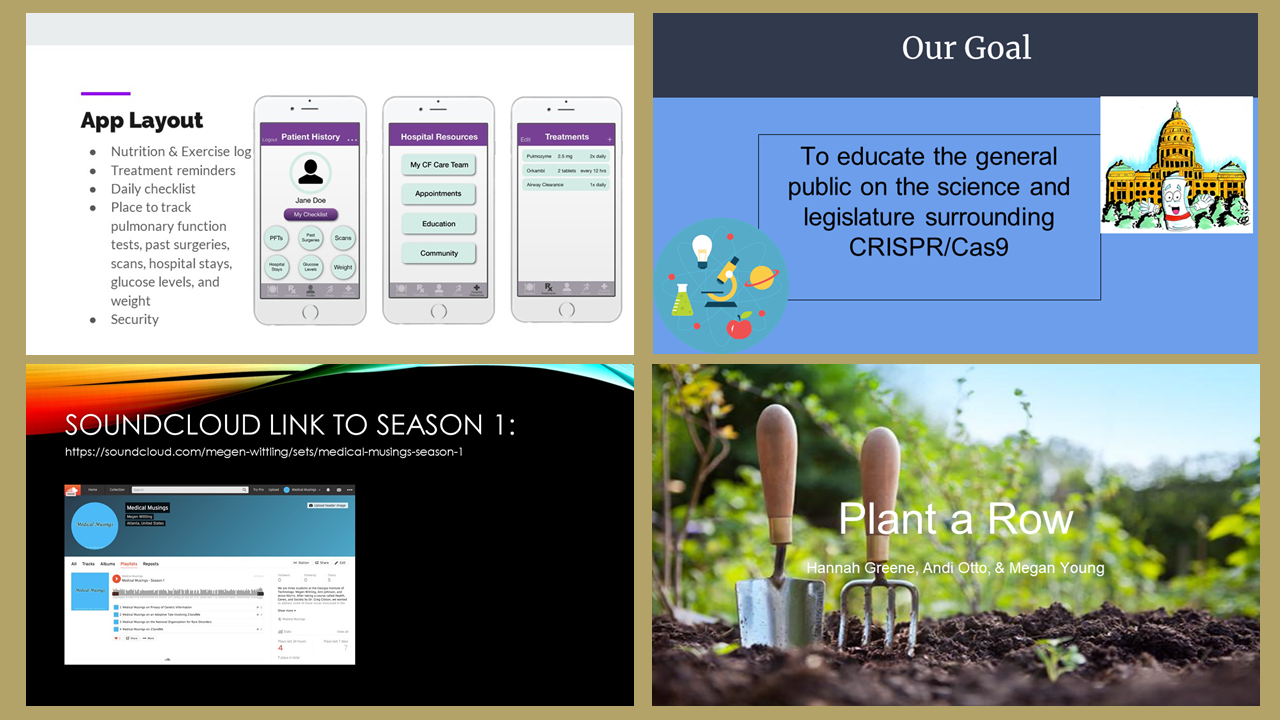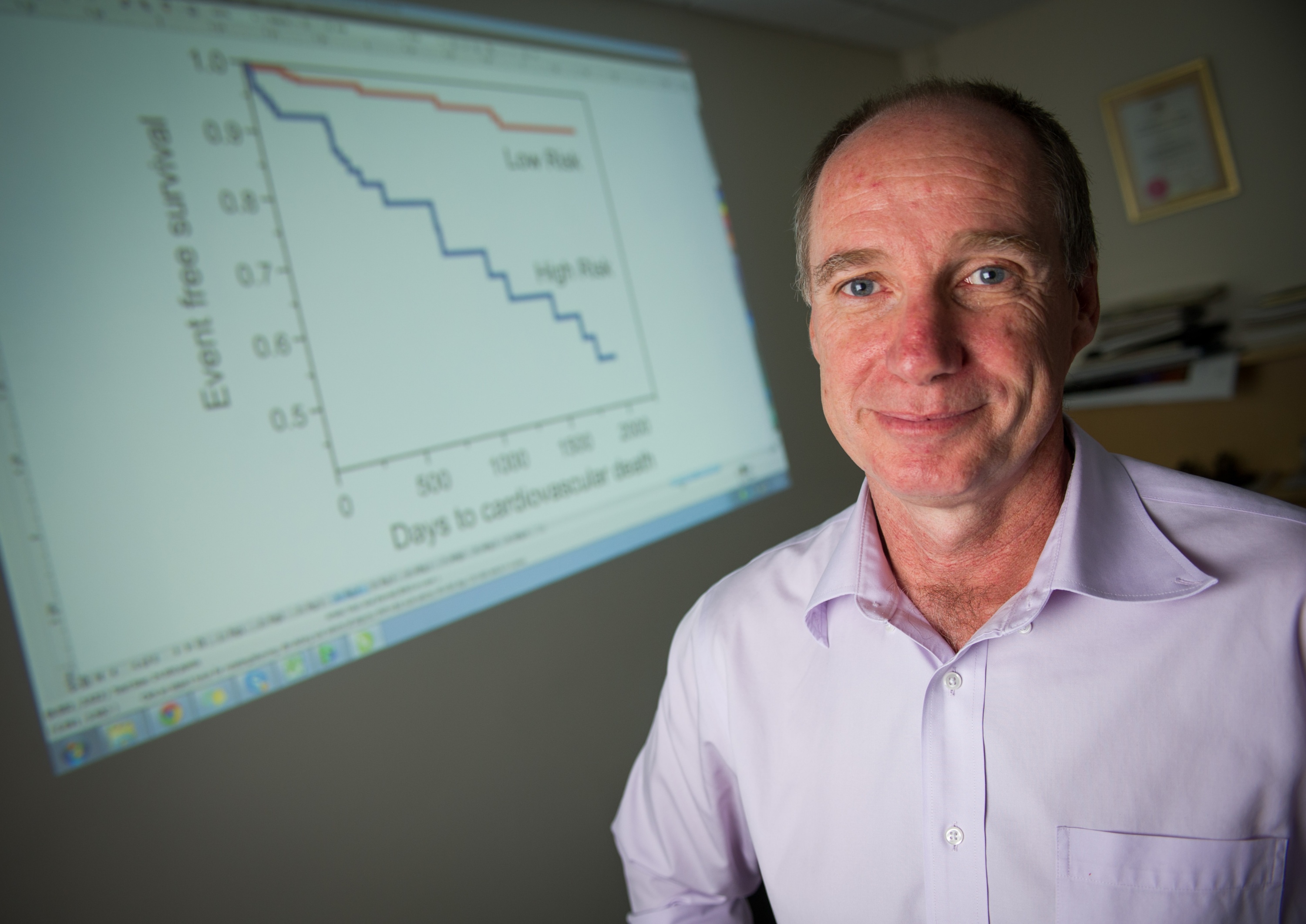After a year’s hiatus, School of Biological Sciences Professor Greg Gibson returned to teaching BIOL 4803C, “Health, Genes and Society,” in spring 2018.
BIOL 4803C is a nontraditional course. It aims to engage students in problems related to personalized medicine. Students form small teams working throughout the semester on a project.
Gibson summarized the semester’s yield in his blog “The Genome’s Take. The April 30, 2018, blog post reveals Gibson’s delight in what third- and fourth-year students submitted at the end of the semester.
“The semester flew by,” says Gibson, who is also a member of the Parker H. Petit Institute for Bioengineering and Bioscience. “Whether students were inspired by projects of previous years or simply have become increasingly media savvy, their efforts pushed the envelope in unique directions this year.”
Following are the seven projects from the spring 2018 class of BIOL 4803C. They reveal students who are curious, skeptical, socially aware, goal-oriented, and intent on providing solutions to societal problems.
For more information about each project and Gibson’s take on the science or policy behind them, see the original blog post or the course website.
CareFull App for Cystic Fibrosis
Amanda Schaefer, Christine Lacek, and Amelia Milas leveraged their interests in public policy, bioinformatics, and medicine. They aimed to provide parents of children with cystic fibrosis a modern solution to care management. CareFull will allow parents to track medications, respiratory exercises, diet, and physical exercise through their smartphones.
BuzzLIfe App for Georgia Tech Students
Caroline Settle, Mikaela Thurman, and Yvonne Nguyen built on a survey of what Georgia Tech students would like to see in an app to help them keep healthy. BuzzLife will link students to resources for campus rides (including late-night safe rides), academic planning, campus dining and nutrition, fitness, and recreation. BuzzLife will also help users control stress and monitor their sleep patterns.
Conference on Mental Health
Collin Spencer, Kristen Vossler, Tessa Paet-Brown laid the groundwork for a national intercollegiate conference on student mental health to be held at Georgia Tech on February 15-17, 2019. The team worked to get Institute-wide support. They sought funds to bring in representatives of local schools, other Atlantic Coast Conference (ACC) Schools, and peer universities nationwide.
CRISPR and Human Genome Engineering
Jared Chin-Shue, Emily Yu, and Chloe Baskowitz reviewed the science and policy around CRISPR. CRISPR is a technique that makes it easy to modify the genetic code. Its use in engineering the human genome is a subject of scientific, ethical, and legislative debates.
The team interviewed scientists and legislative aides. They prepared a white-paper and website to explain the science and policies regarding use of CRISPR.
Personalized Genomics
The personalized genomics industry has attracted 12 million consumers. Catherine Johnson, Claudia Varnedoe, and Soha Noorani produced a virtual flier about Helix.com. The new kid on the bloc of the burgeoning industry has attracted $320 M in venture funding.
Unlike other companies, Helix offers exome sequencing rather than whole-genome genotyping. The exome is the part of the genome that encodes proteins. Another difference is that Helix produces the data and then sells it to a third party for interpretation. Consumers learn what the data say from the third party, at a cost of between $50 and $100.
But what about the science behind Helix? For Gibson’s opinion, read his blog post.
Medical Musings
Ann Johnson, Meg Whittling, and Jessie Morris created four podcasts, called “Medical Musings,” related to personalized medicine:
- the science behind the genetic testing company 23andme
- the NORD (National Organization for Rare Disorders) rare-disease network
- the Genetic Information Nondiscrimination Act (GINA)
- a story about how Ann’s mother found her biological mother and is now learning more about her identity through consumer genomics
“The podcasts were heart-warming and well received,” Gibson says. “It was a joy to see the pleasure this exercise brought to the team. Will there be a Season 2?”
Plant a Row for the Hungry
Andi Otto, Hannah Green, and Megan Young created a website to help the Atlanta Community Food Bank solicit donations and attract volunteers.
The Atlanta Community Food Bank delivers 60 million meals to 750,000 people in 29 counties each year. It is always looking for volunteers and donations. The food bank’s website has a Plant-a-Row section encouraging people to donate surplus vegetables from their gardens. The plan is for the food bank to link directly to the team’s website, https://plantarowforthehungry.weebly.com/, which provides information on how donate surplus vegetables.
What’s Next
“Over four cycles now, students have engaged in various projects, producing teaching resources, designing apps, and contemplating policy,” Gibson says. “Two big challenges are to get students out into communities to make a difference and to turn great ideas into actual apps.”
Gibson hopes to team up with the “Computing for Good” class of the College of Computing to realize these initiatives.
For More Information Contact
A. Maureen Rouhi, Ph.D.
Director of Communications
College of Sciences




